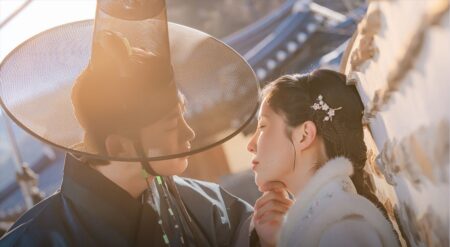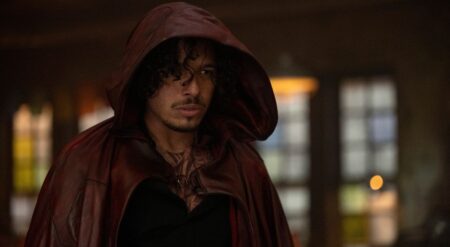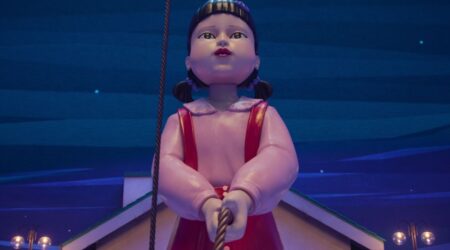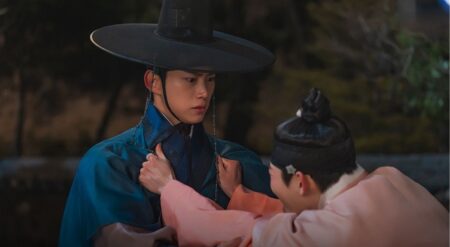
Now in episode five, Harlots, the Hulu Original period piece shot from a “whore’s eye view” focused on 18th century London’s world of prostitution, has flipped the table on every expectation this season. In episode three, we saw the death of Charlotte Wells, one of the lead characters and the one set to be the focus after the season two finale. Last episode, we saw those around her grieve while the leader of the Spartans returned to London and Lydia Quigley (Lesley Manville) got the rights back to Golden Square.
With Charlotte buried, Margaret (Samantha Morton) back in London, and Quigley back in Golden Square, the series is back with the longtime rivals returning to the center stage. As Margaret turns her mind to revenge, it’s clear that she’ll do whatever she needs to seek justice, even if it means walking back to the gallows. Last season, Margaret was hanged but ultimately spared a death sentence which forced her to flee to America.
If Harlots has made anything clear, it’s that if Margaret is found by the authorities, she will be hanged again, and without a friend in the law, she won’t be saved. As she edges closer to the noose, the men in her life, William (Danny Sapani), her partner by love and Jonas Young, her husband on paper, are each trying to save her. The former by looking to the morality of the new Justice Knox (Jack Greenlees), who has proven to be a man of justice, looking out for those who are overlooked by the law, and the latter by pleading with his wife to take her back to America.
In addition to the passive forces that threaten Margaret’s life, Quigley has moved her way back to her old home, using her knowledge of Margaret’s survival as leverage against Lucy (Eloise Smyth), who will do anything to keep her mother safe. But survival is not what Margaret Wells has in mind, only justice for her girl.
Episode five is a true return to form for the series. In addition to the main plot which follows Margaret trying to unravel the truth around Charlotte’s murder, we get the much-needed development of new characters as well as a return to the show viewing the women on their terms. Unlike the last couple of episodes, this one is set around the women of Harlots, new and old.
As the old Quigley emerges, free from Bedlam and her childhood abuser, Kate, the now adopted (for lack of a better word) daughter of Quigley, begins to see her move, plot, and strike. Aided by the words from both Margaret and Anne (Ellie Heydon), thrown out after giving birth, she realizes that her savior is no more than a kidnapping pimp. While the love Quigley has a twist, watching Kate’s confidence and love for her sway is emotional to watch.
But when it comes to emotion, this episode finally gives Nancy (Kate Fleetwood) her due. In episode four, we saw massive amounts of Isaac Pincher, while Nancy remained silent in the background. It felt off, given her deep and maternal connection to Charlotte. Now, in episode five, we see a Nancy at her breaking point. With Charlotte’s death she is having to face being alone again, having her family gone, and the helplessness that comes with that reality.
Nancy is one of Harlots unsung heroes. She is a mother figure, a fighter, a fierce protector of all the girls in her charge. She is loving and she is cold, and she is ultimately the pillar of strength. But as many of us who hide our emotions know, that strength cracks until it crumbles. By focussing on Nancy for once, the show is able to explore a different layer to her character. We know of her great love for the Wells children, but to see her lose one of her girls, we also needed to see her grief.
While episode five continues to expand characters, we also see a return to a focus on the women’s motives. Not for plotting revenge or seeking justice, but instead on the banalities of life: their work. As expressed in season one, the women of 18th century London are survivors of circumstance, and for mothers, doubly so. Over the season so far we’ve seen a relationship build between Harriet (Pippa Bennett-Warner), now a bawd of her own house which exclusively staffs women of color, and the new addition to the cast Jack Lively (Alex Sawyer).

Jack is William’s protege, a fighter and ultimately a man unaccustomed to being with a harlot. His jealousy has repeatedly caused issues for Harriet, whose highest paying customer only has eyes for her. Through his stunts to assert himself as her only lover, Harriet’s money is on the line. But as the two have grown closer, and as episode five shows, the two are more than just a dalliance. But with this newfound love comes an ultimatum for Jack, love Harriet and accept her life or don’t love her at all.
When he seeks out William’s perspective, the show begins to talk to the audience. As relationships form and sex is exchanged, it can be hard for some to understand the dynamics of love, lust, and survival in the show. While they all may involve sex, they each fulfill different narrative goals and build relationships between characters. Jack might be unable to see through his jealousy but William is wiser. Having chosen to be with Margaret, the love of his life, and now fighting for her from a man with means who saved her in America, his perspective is one of experience and ultimately understanding.
William maps it out for Jack. Harriet is a mother first, and she must survive by her wits. There is no room for romances that turn away culls because at the end of the day there are children she must feed and protect. To be with women in this line of work, prostitution, means delineating work from love and selfishness from understanding. In the end, it all comes back to surviving.
But while Jack is learning to accept her, Harriet is confronted with a moral choice. As a free woman who has saved her children from slavery once already, what does she do when the truth of her benefactor is revealed? While it’s been clear since his introduction, the overt fetishization of Harriet is thrust into the spotlight, she decides to make a choice – keep her culls money or turn him away. This is a decision none of the white women of Harlots would have to make and this inclusion in the story brings forth the reality of the time while also giving Harriet the agency to move through her own story for herself.

While she is seemingly in love with Jack, this choice, while convenient to the plot, is not one made for him. And while her cull’s wife instigates the scenario, telling Harriet about the plantations they own, it isn’t one made for her convenience. This decision lies with Harriet and is made for Harriet. But the fallout of her choice is sure to be felt throughout the harlots of London.
Where Harriet confronts her need to earn living with maintaining a moral stance, Elizabeth Harvey (Angela Griffin) offers another look at how the poor women of 18th century London, particularly women of color have identities that offer them life. Her words, “I am what I have to be” may relate to her masquerading her bawdy house as a tailor, but it pulls together the entire show.
The women of Harlots sell their bodies because they have to do. The choices they make in a world that oppresses and abuses them are ones that they perceive they have to. And as the series has shown, perhaps unintentionally, when the women push back against those expectations, their lives become forfeit or cause misfortune for those around them.
As a show, Harlots isn’t a fairytale. There is no Mr. Darcy or Prince Charming coming to take these women away from their struggles, there are only other harlots. This grounds the show in reality. While the costuming and set pieces offer extravagance and beauty, we’re consistently reminded of the world they live in, and how they find their power in powerless situations. And that is the reason Harlots has been able to define a unique space for itself in the genre. Episode 5 reminds viewers that this is a period piece exploring perspectives and lives we don’t often see in others.
Overall, Harlots is back where it started. While some of it is repetitive, like Quigley and Margaret tearing each other down in the same ways we saw in season one, two, and today, other pieces are new, while still embodying the purpose of the show.
Harlots is available to stream on Hulu with new episodes dropping every Wednesday morning.
Harlots, Season 3 - Episode 5
-
Rating - 10/1010/10
TL;DR
Overall, Harlots is back where it started. While some of it is repetitive, like Quigley and Margaret tearing each other down in the same ways we saw in season one, two, and today, other pieces are new, while still embodying the purpose of the show.






